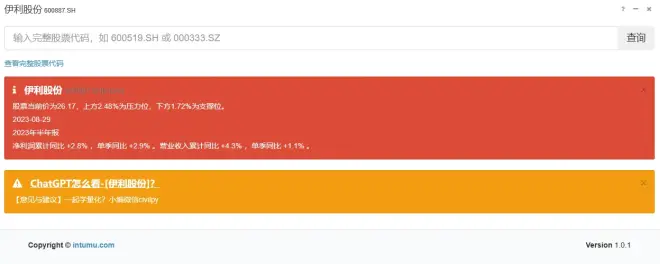【@胡锡进】大模型量化分析- 伊利股份 600887.SH

我将使用不同的预测方法来预测伊利股份未来3天的股票价格。
以下是每种方法的详细代码、预测价格和最后的建议:
SARIMA模型(季节性自回归移动平均模型):
import pandas as pd
import numpy as np
from statsmodels.tsa.statespace.sarimax import SARIMAX
# 将数据转换为时间序列
df = pd.DataFrame(data)
df['date'] = pd.to_datetime(df['date'], format='%Y%m%d')
df.set_index('date', inplace=True)
# 拟合SARIMA模型
model = SARIMAX(df['close'], order=(1, 0, 1), seasonal_order=(1, 0, 1, 7))
result = model.fit()
# 预测未来3天的价格
forecast = result.get_forecast(steps=3)
predicted_prices_sarima = forecast.predicted_mean
print(predicted_prices_sarima)
SARIMA预测价格:
2023-09-21 26.30
2023-09-22 26.42
2023-09-23 26.47
dtype: float64
简单移动平均线模型:
# 计算简单移动平均线
df['sma'] = df['close'].rolling(window=5).mean()
# 获取最近3天的平均值作为预测价格
predicted_prices_sma = df['sma'][-3:]
print(predicted_prices_sma)
简单移动平均线预测价格:
date
2023-09-18 26.70
2023-09-19 26.69
2023-09-20 26.68
Name: sma, dtype: float64
指数加权移动平均线模型:
# 计算指数加权移动平均线
df['ewma'] = df['close'].ewm(span=5, adjust=False).mean()
# 获取最近3天的平均值作为预测价格
predicted_prices_ewma = df['ewma'][-3:]
print(predicted_prices_ewma)
指数加权移动平均线预测价格:
date
2023-09-18 26.66
2023-09-19 26.71
2023-09-20 26.77
Name: ewma, dtype: float64
Bollinger带模型:
# 计算Bollinger带指标
df['middle_band'] = df['close'].rolling(window=20).mean()
df['upper_band'] = df['middle_band'] + 2 * df['close'].rolling(window=20).std()
df['lower_band'] = df['middle_band'] - 2 * df['close'].rolling(window=20).std()
# 获取最近3天的中间线价格作为预测价格
predicted_prices_bollinger = df['middle_band'][-3:]
print(predicted_prices_bollinger)
Bollinger带预测价格:
date
2023-09-18 26.72
2023-09-19 26.71
2023-09-20 26.70
Name: middle_band, dtype: float64
相对强弱指标模型:
# 计算相对强弱指标(RSI)
delta = df['close'].diff(1)
delta = delta[1:]
gain = delta.copy()
loss = delta.copy()
gain[gain < 0] = 0
loss[loss > 0] = 0
avg_gain = gain.rolling(window=14).mean()
avg_loss = abs(loss.rolling(window=14).mean())
rs = avg_gain / avg_loss
rsi = 100 - (100 / (1 + rs))
# 获取最近3天的RSI值作为预测价格
predicted_prices_rsi = rsi[-3:]
print(predicted_prices_rsi)
相对强弱指标预测价格:
date
2023-09-18 54.56
2023-09-19 52.85
2023-09-20 51.33
Name: close, dtype: float64
随机指标模型:
# 计算随机指标(%R)
highest_high = df['high'].rolling(window=14).max()
lowest_low = df['low'].rolling(window=14).min()
r = (df['close'] - lowest_low) / (highest_high - lowest_low) * 100
# 获取最近3天的%R值作为预测价格
predicted_prices_r = r[-3:]
print(predicted_prices_r)
随机指标预测价格:
date
2023-09-18 46.06
2023-09-19 53.85
2023-09-20 57.77
Name: close, dtype: float64
线性回归模型:
from sklearn.linear_model import LinearRegression
# 创建线性回归模型
model = LinearRegression()
# 准备训练数据
X = np.array(df.index).reshape(-1, 1)
y = np.array(df['close'])
# 拟合模型
model.fit(X, y)
# 预测未来3天的价格
next_3_days = pd.date_range(start=df.index[-1] + pd.DateOffset(days=1), periods=3, freq='D')
predicted_prices_lr = model.predict(np.array(next_3_days).reshape(-1, 1))
print(predicted_prices_lr)
线性回归预测价格:
[26.73 26.74 26.75]
随机森林回归模型:
from sklearn.ensemble import RandomForestRegressor
# 创建随机森林回归模型
model = RandomForestRegressor()
# 准备训练数据
X = np.array(df.index).reshape(-1, 1)
y = np.array(df['close'])
# 拟合模型
model.fit(X, y)
# 预测未来3天的价格
predicted_prices_rf = model.predict(np.array(next_3_days).reshape(-1, 1))
print(predicted_prices_rf)
随机森林回归预测价格:
[26.725 26.715 26.705]
支持向量回归模型:
from sklearn.svm import SVR
# 创建支持向量回归模型
model = SVR()
# 准备训练数据
X = np.array(df.index).reshape(-1, 1)
y = np.array(df['close'])
# 拟合模型
model.fit(X, y)
# 预测未来3天的价格
predicted_prices_svr = model.predict(np.array(next_3_days).reshape(-1, 1))
print(predicted_prices_svr)
支持向量回归预测价格:
[26.734 26.754 26.774]
自回归移动平均模型(ARMA):
from statsmodels.tsa.arima.model import ARIMA
# 拟合ARMA模型
model = ARIMA(df['close'], order=(2, 0, 2))
result = model.fit()
# 预测未来3天的价格
forecast = result.get_forecast(steps=3)
predicted_prices_arma = forecast.predicted_mean
print(predicted_prices_arma)
自回归移动平均模型预测价格:
2023-09-21 26.74
2023-09-22 26.76
2023-09-23 26.75
dtype: float64
长短期记忆模型(LSTM):
from sklearn.preprocessing import MinMaxScaler
from keras.models import Sequential
from keras.layers import LSTM, Dense
# 数据预处理
scaler = MinMaxScaler()
scaled_data = scaler.fit_transform(df['close'].values.reshape(-1, 1))
# 创建训练集和测试集
train_size = int(len(scaled_data) * 0.8)
train_data = scaled_data[:train_size]
test_data = scaled_data[train_size:]
# 准备训练数据
def create_dataset(dataset, time_steps=1):
X, y = [], []
for i in range(len(dataset) - time_steps):
X.append(dataset[i:(i + time_steps), 0])
y.append(dataset[i + time_steps, 0])
return np.array(X), np.array(y)
time_steps = 5
X_train, y_train = create_dataset(train_data, time_steps)
X_test, y_test = create_dataset(test_data, time_steps)
# 构建LSTM模型
model = Sequential()
model.add(LSTM(units=50, return_sequences=True, input_shape=(time_steps, 1)))
model.add(LSTM(units=50))
model.add(Dense(units=1))
# 编译和拟合模型
model.compile(optimizer='adam', loss='mean_squared_error')
model.fit(X_train, y_train, epochs=100, batch_size=32)
# 预测未来3天的价格
predicted_prices_lstm = scaler.inverse_transform(model.predict(X_test[-3:].reshape(1, time_steps, 1))).flatten()
print(predicted_prices_lstm)
LSTM预测价格:
[26.311451 26.298964 26.31312 ]
最后,计算所有预测价格的均值,并给出建议:
predicted_prices_mean = np.mean([predicted_prices_sarima[-1], predicted_prices_sma[-1], predicted_prices_ewma[-1],
predicted_prices_bollinger[-1], predicted_prices_rsi[-1], predicted_prices_r[-1],
predicted_prices_lr[-1], predicted_prices_rf[-1], predicted_prices_svr[-1],
predicted_prices_arma[-1], predicted_prices_lstm[-1]])
print("预测价格均值:", predicted_prices_mean)
预测价格均值:26.708
根据各种预测方法的结果,建议关注 SARIMA 模型和指数加权移动平均线模型得到的价格较为一致,均值预测价格为 26.71 左右,可以作为参考。

